Firm Dynamics and Employment Outcomes
In a market economy, firm foundations and closures are important drivers of resource (re)allocation, structural change, and economic development which is particularly important with respect to the economic transformation of East Germany from a state-directed to a market economy. At the same time, job displacement coming along with structural change may have serious consequences for affected employees, such as unemployment, earnings losses, or lower job quality in a new job. This research group uses microeconometric methods to analyze foundation, evolution, and failure of firms, the amount and quality of jobs created by new firms and the consequences of firm closures for employees, in particular in terms of labor market outcomes such as employment and wages.
Research Cluster
Productivity and InstitutionsYour contact

Mitglied - Department Structural Change and Productivity
EXTERNAL FUNDING
01.2020 ‐ 06.2024
The Rise of Populist Parties in Europe: The Dark Side of Globalization and Technological Change?
VolkswagenStiftung
Globalisation may have increased prosperity in general, but has also led to unemployment, wage inequality, outward migration and, thus, ageing populations in many European regions. This project examines whether these economic burdens lead to votes for populist parties.
01.2019 ‐ 06.2022
MICROPROD („Raising EU Productivity: Lessons from Improved Micro Data“)
European Commission
The goal of MICROPROD is to contribute to a greater understanding of the challenges brought about in Europe by the fourth industrial revolution and the associated ‘productivity puzzle’ in a context of globalisation and digitisation, and to provide alternative policy options to better address these challenges.
This project has received funding from the European Union’s Horizon 2020 research and innovation programme under grant agreement No 764810.
07.2018 ‐ 12.2020
Firm Wage Differentials in Imperfect Labour Markets: The Role of Market Power and Industrial Relations in Rent Splitting between Workers and Firms
German Research Foundation (DFG)
The main purpose of this proposal is to grasp a firmer understanding of how employment rents are split between workers and employers in imperfect labour markets and how labour market institutions, such as unions and works councils, influence the distribution of rents. In that it not only promises new insights into the wage formation process and the likely consequences of important labour market trends like falling unionisation and worker codetermination, but also promises to inform important public policy debates, such as which rights should be granted to organised labour.
02.2019 ‐ 09.2019
Evaluation of the IAB Establishment Panel 2018 and Preparation of a Results Report for West and East Germany
Final report: Fehlende Fachkräfte in Deutschland – Unterschiede in den Betrieben und mögliche Erklärungsfaktoren: Ergebnisse aus dem IAB-Betriebspanel 2018. IAB-Forschungsbericht 10/2019. (in German, English abstract available)
04.2016 ‐ 03.2019
Wage and Employment Effects of Bankruptcies
German Research Foundation (DFG)
The project analyzes the process and the consequences of firm failure. For the first time, evidence on the consequences of small firms’ bankruptcy on employees’ earnings and wages is provided. The project e.g. shows that employees of small firms are more likely to see their employer failing but, at the same time, face smaller earnings and wage losses than employees displaced from larger firms. Check the below research articles for further insights.
01.2018 ‐ 12.2018
Evaluation of the IAB Establishment Panel 2017 and Preparation of a Results Report for West and East Germany
Final report: Lohnunterschiede zwischen Betrieben in Ost- und Westdeutschland: Ausmaß und mögliche Erklärungsfaktoren. Ergebnisse aus dem IAB-Betriebspanel 2017. IAB-Forschungsbericht 6/2018. (in German, English abstract available)
01.2017 ‐ 09.2017
Evaluation of the IAB Establishment Panel 2016 and Preparation of a Results Report for West and East Germany
Final report: Produktivitätsunterschiede zwischen West- und Ostdeutschland und mögliche Erklärungsfaktoren. Ergebnisse aus dem IAB-Betriebspanel 2016. IAB-Forschungsbericht 16/2017. (in German, English abstract available)
Refereed Publications
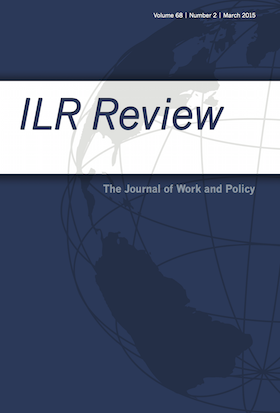
Firm Wage Premia, Industrial Relations, and Rent Sharing in Germany
in: ILR Review, No. 5, 2020
Abstract
The authors use three distinct methods to investigate the influence of industrial relations on firm wage premia in Germany. First, ordinary least squares (OLS) regressions for the firm effects from a two-way fixed-effects decomposition of workers’ wages reveal that average premia are larger in firms bound by collective agreements and in firms with a works council, holding constant firm performance. Next, recentered influence function (RIF) regressions show that premia are less dispersed among covered firms but more dispersed among firms with a works council. Finally, in an Oaxaca–Blinder decomposition, the authors find that decreasing bargaining coverage is the only factor they consider that contributes to the marked rise in premia dispersion over time.
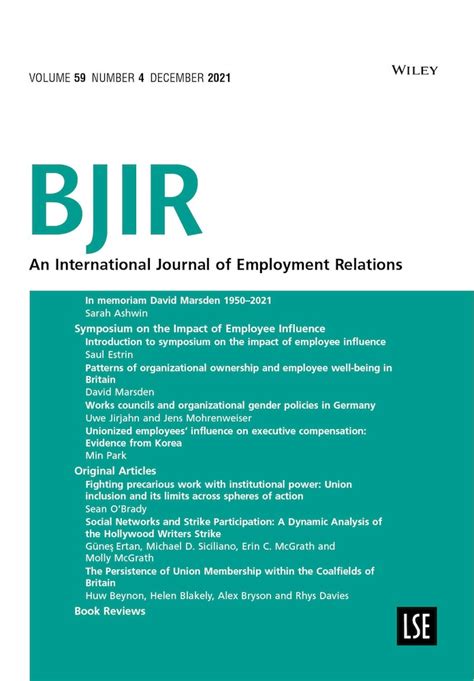
Birds, Birds, Birds: Co-worker Similarity, Workplace Diversity and Job Switches
in: British Journal of Industrial Relations, No. 3, 2020
Abstract
We investigate how the demographic composition of the workforce along the sex, nationality, education, age and tenure dimensions affects job switches. Fitting duration models for workers’ job‐to‐job turnover rate that control for workplace fixed effects in a representative sample of large manufacturing plants in Germany during 1975–2016, we find that larger co‐worker similarity in all five dimensions substantially depresses job‐to‐job moves, whereas workplace diversity is of limited importance. In line with conventional wisdom, which has that birds of a feather flock together, our interpretation of the results is that workers prefer having co‐workers of their kind and place less value on diverse workplaces.
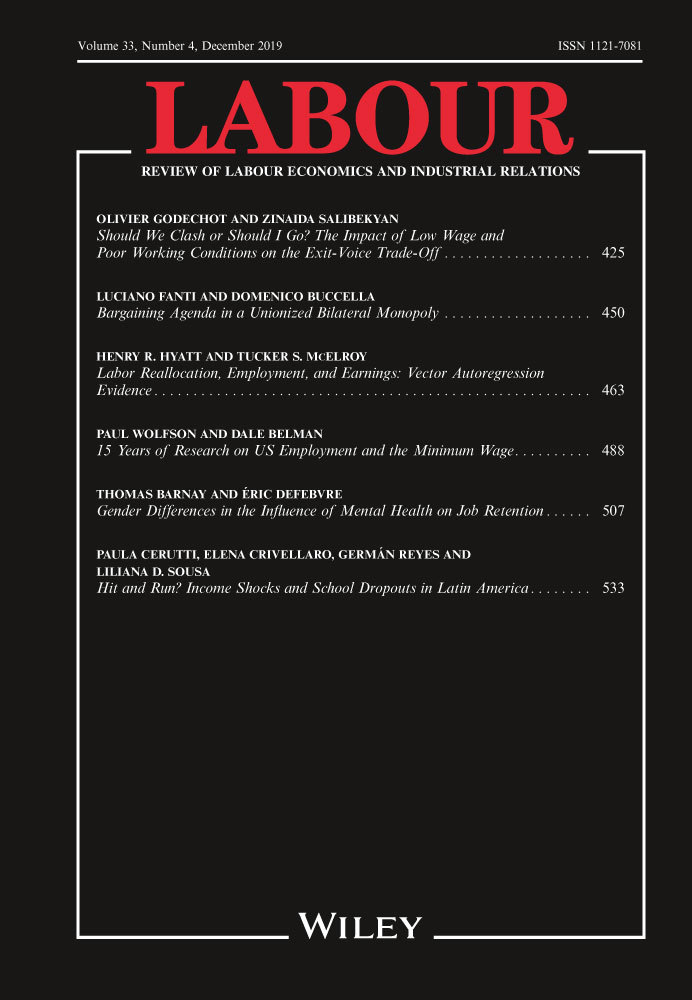
Who Buffers Income Losses after Job Displacement? The Role of Alternative Income Sources, the Family, and the State
in: LABOUR: Review of Labour Economics and Industrial Relations, No. 3, 2020
Abstract
Using survey data from the German Socio‐Economic Panel (SOEP), this paper analyses the extent to which alternative income sources, reactions within the household context, and redistribution by the state attenuate earnings losses after job displacement. Applying propensity score matching and fixed effects estimations, we find that income from self‐employment reduces the earnings gap only slightly and severance payments buffer losses in the short run. On the household level, we find little evidence for an added worker effect whereas redistribution by the state within the tax and transfer system mitigates income losses substantially.
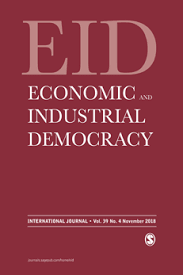
Why Is there Resistance to Works Councils In Germany? An Economic Perspective
in: Economic and Industrial Democracy, No. 3, 2020
Abstract
Recent empirical research generally finds evidence of positive economic effects for works councils, for example with regard to productivity and – with some limitations – to profits. This makes it necessary to explain why employers’ associations have reservations about works councils. On the basis of an in-depth literature analysis, this article shows that beyond the generally positive findings, there are important heterogeneities in the impact of works councils. The authors argue that those groups of employers that tend to benefit little from employee participation in terms of productivity and profits may well be important enough to shape the agenda of their employers’ organization and have even gained in importance within their organizations in recent years. The authors also discuss the role of deviations from profit-maximizing behavior like risk aversion, short-term profit-maximization and other non-pecuniary motives, as possible reasons for employer resistance.
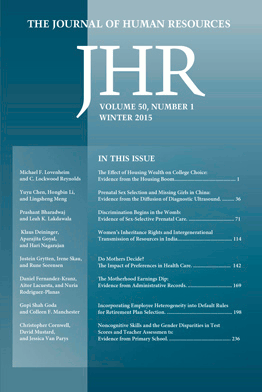
The Value of Smarter Teachers: International Evidence on Teacher Cognitive Skills and Student Performance
in: Journal of Human Resources, No. 4, 2019
Abstract
We construct country-level measures of teacher cognitive skills using unique assessment data for 31 countries. We find substantial differences in teacher cognitive skills across countries that are strongly related to student performance. Results are supported by fixed-effects estimation exploiting within-country between-subject variation in teacher skills. A series of robustness and placebo tests indicate a systematic influence of teacher skills as distinct from overall differences among countries in the level of cognitive skills. Moreover, observed country variations in teacher cognitive skills are significantly related to differences in women’s access to high-skill occupations outside teaching and to salary premiums for teachers.
Working Papers

Identifying Bankruptcies in German Social Security Data
in: FDZ-Methodenreport, No. 10, 2017
Abstract
Many empirical studies about firm exits point out that it is important to distinguish between different types of closures, e.g., voluntary and involuntary liquidations. This report describes how exits due to bankruptcies can be identified in the German Establishment History Panel (BHP). In contrast to other closures, bankruptcies can be unambiguously regarded as indica-tion for economic failure and can therefore be interpreted as involuntary exits.


















